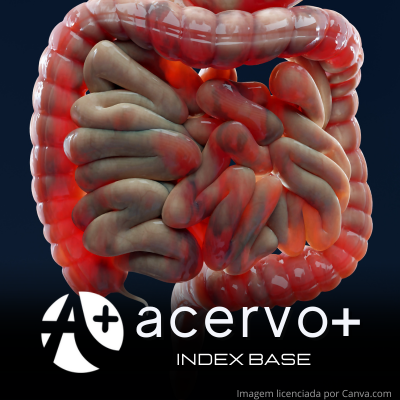Síndrome do intestino irritável: uma revisão integrativa das alternativas de tratamento
##plugins.themes.bootstrap3.article.main##
Resumo
Objetivo: Elucidar os tratamentos alternativos mais eficazes disponíveis sobre a Síndrome do Intestino Irritável (SII), bem como suas terapias complementares. Métodos: Este estudo é uma revisão integrativa da literatura, que conduziu uma busca abrangente de artigos em bancos de dados eletrônicos, incluindo PubMed, Medline e Science Direct. A pesquisa foi realizada utilizando combinações de palavras-chave em inglês, como "irritable bowl syndrome”, “alternative treatments for bowl”, “abdominal pain” e “Monosaccharides and Polyols (FODMAP)". Em seguida, foi realizada uma seleção de artigos publicados nos últimos cinco anos (2019-2023), abrangendo um total de 13 artigos elencados. Resultados: Dentre os treze artigos selecionados, dois envolviam tratamento alternativo com acupuntura (10,52%), três com probióticos (15,78%), seis em dieta elaborada pobre em FODMAP’s (36,84%) e sete com medicamentos fitoterápicos (36,84%). Não obstante, as pesquisas foram realizadas em países desenvolvidos (China, Itália, Polônia) onde aproximadamente 10-15% da população apresenta SII. Contudo, o Brasil, que apresenta um quadro similar, não apresentou nenhuma pesquisa a respeito do tema abordado. Considerações finais: Os tratamentos alternativos de medicamentos fitoterápicos desta revisão se mostraram estratégias viáveis a serem empregadas por gastroenterologistas, principalmente devido aos seus efeitos benéficos complementares.
##plugins.themes.bootstrap3.article.details##
Copyright © | Todos os direitos reservados.
A revista detém os direitos autorais exclusivos de publicação deste artigo nos termos da lei 9610/98.
Reprodução parcial
É livre o uso de partes do texto, figuras e questionário do artigo, sendo obrigatória a citação dos autores e revista.
Reprodução total
É expressamente proibida, devendo ser autorizada pela revista.
Referências
2. BONETTO S, et al. Recent advances in the treatment of irritable bowel syndrome. Pol Arch Intern Med, 2021; 131: 709-715.
3. CHEN Y, et al. Involvement of Pirt/TRPV1 signaling in acupuncture-induced reduction of visceral hypersensitivity in diarrhea-predominant irritable bowel syndrome rats. Acupuncture Research, 2021; 46: 278–283.
4. CHOJNACKI C, et al. The Usefulness of the Low-FODMAP Diet with Limited Tryptophan Intake in the Treatment of Diarrhea-Predominant Irritable Bowel Syndrome. Nutrients, 2021; 15: 1837.
5. COCETTA V, et al. Maintenance of intestinal epithelial barrier integrity by a combination of probiotics, herbal extract, and vitamins. Minerva pediatrics, 2023; 1.
6. FIORINI G, et al. Efficacy of a new nutraceutical formulation: L-tryptophan, probiotics, charcoal, chamomile, mint, and licorice (COLONIR®) in the improvement of gastrointestinal symptoms in subjects with irritable bowel syndrome. Minerva Gastroenterol (Torino), 2023; 69: 23-127.
7. HADDAD LM, et al. Síndrome do intestino irritável: uma visão integrada ao Roma III. 2. ed. São Paulo: Segmento Farma, 2008; 132.
8. HEYDARI P, et al. A double-blind randomized clinical trial of Dracocephalum kotschyi Boiss. in the patients with diarrhea-predominant irritable bowel syndrome. Research in Pharmaceutical Sciences, 2023; 18: 89-99.
9. ISAKOV VA, et al. Evaluation of the Efficacy of Kombucha-Based Drink Enriched with Inulin and Vitamins for the Management of Constipation-Predominant Irritable Bowel Syndrome in Females: A Randomized Pilot Study. Science Direct, Current Developments in Nutrition, 2023; 7: 102037.
10. LAI Y. et al. Assessing the post-treatment therapeutic effect of tongxie in irritable bowel syndrome: A randomized controlled trial. Science Direct, Complementary Therapies in Medicine, 2022; 68: 102839.
11. MERECZ K, et al. An overview of 5-HT3 receptor antagonists as a treatment option for irritable bowel syndrome with diarrhea. Expert Opin Pharmacother, 2023; 24: 1189-1198.
12. MÜLLER A, et al. Effectiveness of osteopathic manipulative therapy for managing symptoms of irritable bowel syndrome: a systematic review. Journal of Osteopathic Medicine, 2014; 114: 470-9.
13. PASSOS MCF. Síndrome do intestino irritável: ênfase ao tratamento. Jornal Brasileiro de Gastroenterologia, 2006; 6: 12-8.
14. SADRIN S, et al. A 2-strain mixture of Lactobacillus acidophilus in the treatment of irritable bowel syndrome: A placebo-controlled randomized clinical trial. Dig Liver Dis, 2020; 52: 534-540.
15. SCHMULSON MJ e DROSSMAN DA. What Is New in Rome IV? Journal Neurogastroenterol Motil, 2017; 23: 151-163.
16. SCUDERI AS, et al. Efficacy of a Product Containing Xyloglucan and Pea Protein on Intestinal Barrier Function in a Partial Restraint Stress Animal Model. International journal of molecular sciences, 2022; 23: 2269.
17. SIMON E, et al. Probiotics, Prebiotics, and Synbiotics: Implications and Beneficial Effects against Irritable Bowel Syndrome. Nutrients, 2021; 13: 2112.
18. QI LY, et al. Acupuncture for the Treatment of Diarrhea-Predominant Irritable Bowel Syndrome: A Pilot Randomized Clinical Trial. JAMA Netw Open, 2022; 5: 2248817.

